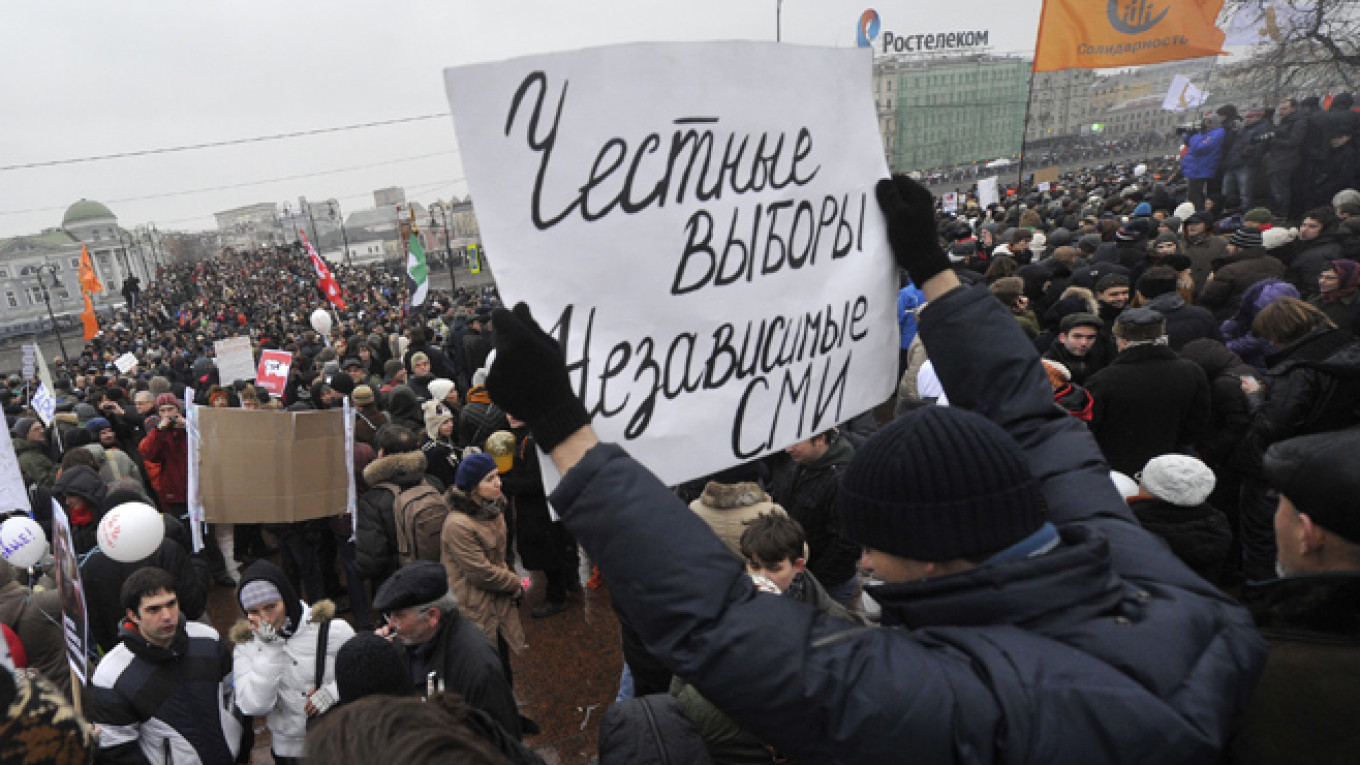The lights went out without so much as a flicker in the Moscow apartment shared by Andrei Barabanov, his mother and girlfriend one evening in late May four years ago. Thinking the fuse box must have blown, Barabanov's mother Tatyana unlocked the front door to step out into the corridor.
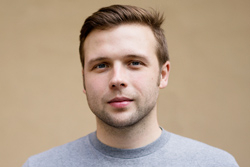
Ilya Gushchin
National Democratic Party member, Psychology student, Sports analyst at Moskva football club
Detained Feb. 7, 2013. Released Aug. 5, 2015. Sentenced to 2 1/2 years in prison for participating in mass riots and employing force against law enforcement by lifting up an OMON officer by the vest and helmet.
"This has meant something for our generation."
Now works for Rus Sidyashchaya prisoners' charity fund.
At that point, a team of eight officers of Russia's OMON riot police and a heavyset investigator stormed into their home. "It was like a scene from the movies," says Tatyana. "As if they were arresting a high-profile criminal."
Andrei Barabanov was dragged out of the apartment barefoot, then thrown into the back of a police van. An OMON officer's foot pressed his head down onto the floor. He remembers thinking to himself: "Andrei, you won't see your home for another four years." His calculation wasn't far off: It would be three years and seven months before he would return to his own bed.
His crime had been to participate in a protest rally several weeks earlier on central Moscow's Bolotnaya Ploshchad. The rally was the culmination of an anti-Kremlin protest movement that had gained momentum in late 2011 following disputed parliamentary elections. It spilled over into 2012, when Vladimir Putin secured a third term as president.
Sunday May 6 was the day before Putin's inauguration. Tens of thousands of mostly middle-class protesters joined the "March of Millions" toward Bolotnaya square, across the river from the Kremlin. When they arrived, they were met by a phalanx of riot police, blocking further passage. The crowd that built up had nowhere to go but forward, toward the officers. Violent clashes followed, with rocks and other objects being hurled at police. The officers responded with unprecedented force, using tear gas, tasers and lashing out with batons.
Hundreds of protesters were detained and shortly afterward released. It looked briefly as if that was the end of the story, but Russian authorities returned with a vengeance. Some of the Bolotnaya protesters were re-detained and charged with participating in mass riots and using force against law enforcement. Many received year-long prison sentences, often for vaguely defined crimes. The string of 35 cases (to date) has collectively become known as the Bolotnoye case.
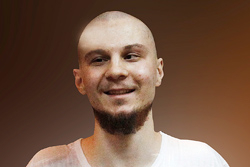
Vladimir Akimenkov
Left Front activist
Detained on June 10, 2012. Released on a Kremlin amnesty on Dec. 19, 2013. Spent 557 days in detention on charges of participating in mass riots.
"The others forbade me from rejecting the amnesty. But the fact that it was a partial amnesty, that they made innocent people feel guilty, is harsh."
Now coordinates help and funds for political prisoners.
By now, most of the Bolotnoye defendants have served their terms. But there can be no return to normal, three of the Bolotniki, as they call themselves, told The Moscow Times.
"There is life before May 6, before my head-on encounter with the system. And life after," says Barabanov, 25, speaking on the fourth anniversary of the Bolotnaya protest. "They're completely different."
Knock Knock
Barabanov and two other protesters were among the "first wave," detained shortly after the Bolotnaya rally. Vladimir Akimenkov was detained a month later. As a member of the far-left organization Left Front, he had been actively involved in protests. He had also been detained by police before. So he wasn't surprised when they showed up at his home. "Any person engaged in politics in an authoritarian country should be prepared to go to prison," he says stoically, sitting in a Moscow cafe. "When they came for me, I was ready."
Not everyone had the benefit of such foresight. Nine months after Bolotnaya, police showed up at Ilya Gushchin's door in the early hours of the morning. They asked him to come to the Investigative Committee's office as a witness. He would be back by nightfall, investigators said. But once Gushchin had confirmed his identity in footage of the clashes, he became a suspect. He never did return home that night.
State Revenge
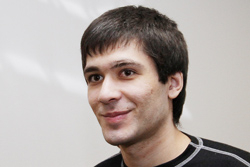
Andrei Barabanov
Math graduate
Detained on May 28, 2012. Released Dec. 25, 2015. Sentenced to three years and seven months in prison for participating in mass riots and employing force against law enforcement by kicking and punching police.
"The clashes that day were provoked and pre-planned by the authorities."
Now works for Rus Sidyashchaya prisoners' charity fund.
Gushchin does not deny he used force against an OMON officer that Sunday. "He was beating a person who was lying on the ground, and I pulled him up by his vest and his helmet," says Gushchin, who looks like a stockier, Russian version of James Dean. He says he was acting on instinct. Like other Bolotnoye suspects, however, Gushchin says the charges against him were deliberately exaggerated. The OMON officer claimed he suffered neck damage as a result of Gushchin's actions. Gushchin is skeptical.
Barabanov received his more than three-year sentence for hitting and kicking officers, actions that appear to be confirmed by video footage. Other accusations against him included "insulting the government" and biting an OMON officer in his bulletproof vest when he was detained.
But Akimenkov, who marched in a suit jacket and tie, says his case was entirely fabricated. He reportedly hurled a flag pole, hitting an OMON guard in the chest. Akimenkov, who is visually impaired, says he is "not exactly an athlete" and nowhere near physically strong enough for such a feat. He thinks his prior political activism made him a target for prosecutors.
In general, the defendants feel the court proceedings against them were more fiction than truth. None of the law enforcement officers on duty that day were investigated for poor crowd management or using excessive force against unarmed civilians.
For some Bolotnoye defendants, the authorities' clear bias makes it easier to accept what followed. "I never took it personally," says Gushchin. "I always understood that they took a random sample, and I happened to be included in it." But for Barabanov, the seemingly arbitrary nature of the case is also cause for torment. "I could've not gone to the protest. I could've left earlier. I could've not been detained that day," he says. He's been over the probabilities "hundreds of times" in his head.
Locked Up
By the time Gushchin received his 2 1/2-year sentence, he had already spent almost two years in a detention center and had only eight months left to serve. At that moment, the verdict felt like a windfall. "We celebrated in court," says his mother Olga.
Gushchin, who has now been out of jail for nine months, can see the humor in his time behind bars. He points to the "culture shock" of being locked in a 9-square-meter cell with two other inmates with completely different backgrounds and tastes. The detention centers and prisons were filled with mostly drug dealers, thieves and people jailed on embezzlement charges — not his usual crowd.
Stuck in the tiny cell for 23 hours a day, his companions would scour their horoscopes in magazines, looking for predictions of what the future might bring. "New acquaintances, new loves," Gushchin laughs. He describes as "a nightmare" their love for cheap entertainment programs. "The television was always blaring," he says. He later convinced them to switch to the culture channel.
But behind the anecdotes, the Bolotniki also describe a sense of claustrophobia and societal alienation. "Russian jail is a post-gulag system," says Barabanov, his speech soft and thoughtful. "The entire purpose is to subjugate a person," he says.
Letters written by relatives and strangers, illegally smuggled music and books provided lifelines and some refuge from their spartan surroundings.
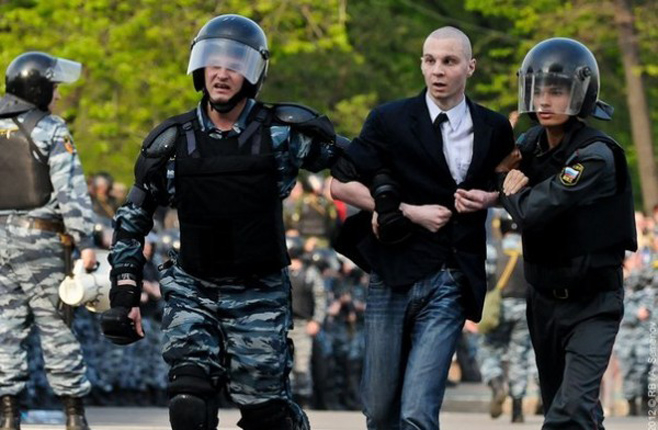
Vladimir Akimenkov being detained by police on May 6, 2012. "I was horrified that they were beating people up. I wanted to tell them to stop using force. But as soon as I walked over, they grabbed me."
And Now?
Barabanov was released from jail in December 2015. A little over a month after his release, he started working at Rus Sidyashchaya (Russia behind bars), a charity group for prisoners. He has returned to his mother's apartment. And yet sitting in the small office, cluttered with books and packages ready to be sent off, he looks on his guard. He is sure his phone and online communication is still being watched by the authorities.
"They say you need to spend one month in freedom for every year spent in prison," he says. "But I feel that you need at least six months." He takes the days as they come. Planning ahead is still difficult, he says.
Speaking to The Moscow Times, Barabanov's mother Tatyana said the years spent in prison had aged her son beyond his years. Aside from his interest in politics, at the time of his arrest Barabanov had also been a normal young man who loved airbrush painting and snowboarding. That lightness is now gone, she says. "I don't see him taking any real pleasure in life, even though he's very young," she says.
Gushchin, who also works for Rus Sidyashchaya, says his life is now about the small things. Following his release, he met a girl and fell in love. He's looking for a new apartment. But some traces remain. Jail has made him more aggressive, he says. "Prisoners' favorite pastime is to chew each other up," he says. "You're always anticipating the worst outcome. I try to tell myself: You're now in a normal world, everything is okay."
Akimenkov, who was released early on a Kremlin amnesty, appears to have come through his trial empowered. He now runs a one-man operation coordinating help and raising funds for about 40 prisoners behind bars on politically motivated charges."An icy calm has come over me that even scares the cops away," he says. He demonstrates his intimidating glare.
As well as new work, Bolotnaya has brought the group new friends. Barabanov, Gushchin and Akimenkov form part of a close-knit Bolotniki group. Despite their different political views, they now share a common history that has outlasted their prison terms.
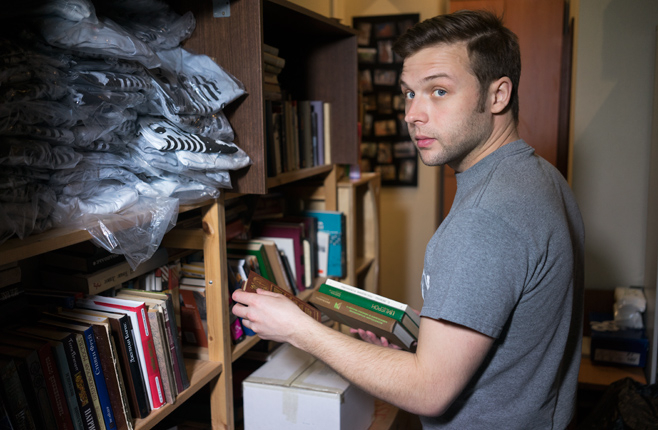
Ilya Gushchin at the Rus Sidyashchaya office where he and Barabanov now work. "In 2011-2012, there was a shared idea and the illusion that you could protest safely. Now, there's a sense of danger."
No Ideas
Four years after Bolotnaya, the era of prosperity under Putin has come to a standstill. More people have fallen below the poverty line. Some predict economic hardships could breathe new life into the protest movement.
But on May 6 this year, Bolotnaya Ploshchad looks largely empty. Only several dozen activists have shown up for a rally on the four-year anniversary. All three Bolotniki say they were struck by the change in atmosphere in Russian society upon their release from prison.
"There is a total lack of new, inspired ideas," says Gushchin. "If people are going to take to the streets, it will have to be for something. Not just against the current regime."
Their own experience has dampened any hopes of peaceful protest leading to reform. In fact, Akimenkov's anarchist views have been strengthened by the Bolotnoye experience and what he sees as the opposition's readiness to put their egos first, and true reform second. He predicts a violent revolution sometime in the future. "It will be a bloody porridge," he says.
Meanwhile, the Russian authorities are not relaxing their grip. When a girl holds up a handmade cardboard sign reading: "The Bolotnoye case is a state crime," on the square on May 6 this year, she is bundled into a police van by a team of six OMON officers. In total, eight people are detained on the evening of the anniversary for holding an unsanctioned protest, according to the Interfax news agency.
Barabanov decided against attending the anniversary this year. He was sure he would be detained. What about if another mass protest movement arose in the future. Would he go then?
"I don't know," he laughs nervously. "Only if I knew the outcome beforehand. I don't have another three years and seven months to spare."
Contact the author at e.hartog@imedia.ru. Follow the author on Twitter at @EvaHartog
A Message from The Moscow Times:
Dear readers,
We are facing unprecedented challenges. Russia's Prosecutor General's Office has designated The Moscow Times as an "undesirable" organization, criminalizing our work and putting our staff at risk of prosecution. This follows our earlier unjust labeling as a "foreign agent."
These actions are direct attempts to silence independent journalism in Russia. The authorities claim our work "discredits the decisions of the Russian leadership." We see things differently: we strive to provide accurate, unbiased reporting on Russia.
We, the journalists of The Moscow Times, refuse to be silenced. But to continue our work, we need your help.
Your support, no matter how small, makes a world of difference. If you can, please support us monthly starting from just $2. It's quick to set up, and every contribution makes a significant impact.
By supporting The Moscow Times, you're defending open, independent journalism in the face of repression. Thank you for standing with us.
Remind me later.


